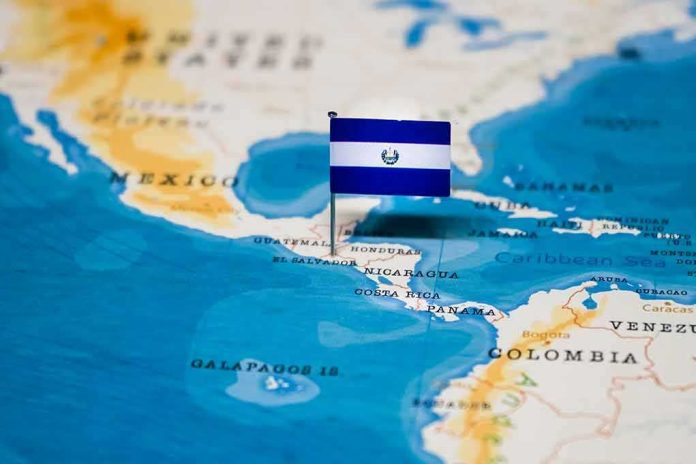
El Salvador’s president now holds the power to run for office without term limits, igniting a fierce debate over the future of democracy in the Central American nation.
Story Snapshot
- El Salvador’s parliament voted to abolish presidential term limits and extend terms to six years.
- President Nayib Bukele, already re-elected in 2024, is now eligible for indefinite re-election.
- Critics warn of authoritarianism and the dismantling of democratic checks and balances.
- Bukele’s supporters claim these changes reflect the popular will due to his crackdown on crime.
Bukele’s Power Consolidation: What Changed and Why It Matters
On August 1, 2025, El Salvador’s Legislative Assembly, dominated by President Nayib Bukele’s New Ideas party, approved sweeping constitutional reforms that abolished presidential term limits and extended the length of presidential terms from five to six years. The amendments passed with a supermajority—57 out of 60 votes—effectively allowing Bukele, who won re-election in 2024, to seek office indefinitely. The reforms also synchronize legislative, presidential, and municipal elections, moving the next general elections to March 2027. This rapid overhaul of the political system is nearly unprecedented in Latin America over the past few decades and has drawn immediate international and domestic scrutiny.
Celebrations erupted among Bukele loyalists following the vote, while opposition lawmakers and human rights groups sounded the alarm, describing the move as a death knell for Salvadoran democracy. Assembly President Ernesto Castro, a close Bukele ally, declared, “Thank you for making history, colleagues,” highlighting the administration’s view that the reforms are a necessary evolution for the nation. Opposition leader Marcela Villatoro responded in stark contrast, stating, “Democracy died in Salvador… masks were removed.” Rights groups have reported increased arrests of journalists and civil society leaders in the days leading up to the vote, intensifying concerns of growing repression.
Historical Roots and Democratic Safeguards Undone
El Salvador’s 1983 Constitution was designed to prevent the return of authoritarian rule, explicitly prohibiting consecutive presidential re-election in response to the country’s traumatic history of military dictatorship and civil war. Bukele, elected in 2019 on a platform promising to clean up government and restore order, quickly consolidated power after his party won a supermajority in 2021. That same year, the Assembly removed top Constitutional Court judges and the Attorney General, installing loyalists who later ruled Bukele could run for re-election in 2024 despite constitutional prohibitions. The 2025 reforms are the culmination of these efforts, removing perhaps the last serious barrier to indefinite personal rule.
Bukele’s popularity has soared, largely due to his tough anti-gang policies, which have dramatically lowered homicide rates but raised serious human rights concerns. His government’s aggressive approach to crime, along with attacks on critical journalists and NGOs, has led many observers to warn that El Salvador is trading its fragile democracy for strongman rule. While supporters argue the reforms were made possible by Bukele’s clear electoral mandate and the improved security situation, critics counter that popularity is no justification for dismantling fundamental checks and balances.
Opposition, Civil Society, and International Response
Opposition lawmakers and civil society groups have described the changes as a clear example of democratic backsliding—where elected leaders use their power to erode democratic institutions and entrench themselves in office. Human rights organizations point to the recent wave of arrests and the atmosphere of intimidation as evidence of mounting repression. Internationally, organizations such as the Organization of American States and the United Nations, alongside several foreign governments, have expressed deep concern over the direction of El Salvador’s government, warning of the long-term risks of one-party rule and authoritarianism.
Despite the outcry, Bukele’s dominance over the legislative and judicial branches makes reversing these changes nearly impossible in the short term. Civil society and opposition figures remain marginalized and under pressure. The risk is not only domestic—observers warn that Bukele’s example could embolden other leaders in Latin America to follow suit, setting a dangerous precedent for the region’s democratic norms.
What This Means for Salvadorans and Beyond
With the reforms now law, President Bukele is eligible to run for a third term and beyond, fundamentally altering the nation’s political landscape. Supporters see continued leadership as vital to maintaining security and economic progress, while opponents fear a slide into authoritarian rule. The next general elections, now set for March 2027, will be the first major test of the new system.
The debate over El Salvador’s future is far from settled. For American readers, especially those who value constitutional limits on executive power and the checks and balances that are foundational to our own republic, the Salvadoran experience serves as a warning about the fragility of democratic institutions. When a leader, no matter how popular, is allowed to rewrite the rules to stay in power, it challenges the very definition of representative government and risks eroding the freedoms that so many have fought to defend.
Sources:
Le Monde: El Salvador abolishes presidential term limits, allowing Bukele to run again
DW: El Salvador approves indefinite presidential reelection
Wikipedia: 2027 Salvadoran presidential election



